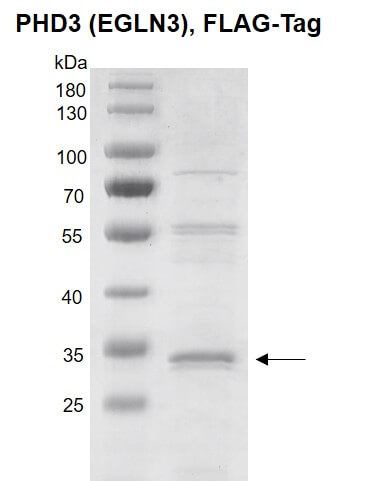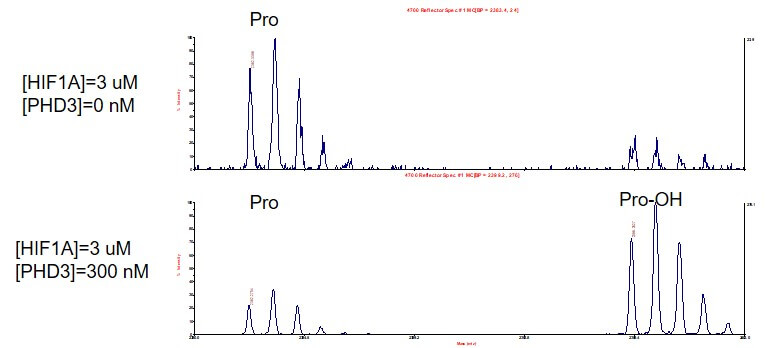Recombinant PHD3 (EGLN3) protein, FLAG-Tag
Expressed In
Baculovirus
Protein Species
Human
Cat No : 81215
Validation Data Gallery
Product Information
| Expressed In | Baculovirus |
| Protein Species | Human |
Contents
Recombinant PHD3 (EGLN3) protein, FLAG-Tag is supplied in 25 mM HEPES pH 7.5, 300 mM NaCl, 10% glycerol, 0.04% Triton X-100, and 0.5 mM TCEP.
Background
Prolyl Hydroxylase Domain-Containing Protein 3 (PHD3) or Egl-9 Family Hypoxia Inducible Factor 3 (EGLN3), also known as PHIF-PH3 or HPH-3, is a prolyl hydroxylase. PHD3 is a cellular oxygen sensor that catalyzes the post-translational formation of 4-hydroxyproline in hypoxia-inducible factor (HIF) alpha proteins under normoxic conditions. It can hydroxylate a specific proline found in each of the oxygen-dependent degradation (ODD) domains (N-terminal, NODD, and C-terminal, CODD) of HIF1A, also HIF2A. PHD3 has a preference for the CODD site for both HIF1A and HIF2A. Hydroxylation on the NODD site by PHD3 appears to require prior hydroxylation on the CODD site, and then hydroxylated HIFs are targeted for proteasomal degradation via the von Hippel-Lindau ubiquitination complex. Under hypoxic conditions, the hydroxylation reaction is attenuated allowing HIFs to escape degradation resulting in their translocation to the nucleus, heterodimerization with HIF1B, and increased expression of hypoxy-inducible genes. PHD3 can also hydroxylate PKM in hypoxia, limiting glycolysis, while under normoxia, hydroxylate and regulates the stability of ADRB2. In cardiomyocytes, it inhibits the anti-apoptotic effect of BCL2 by disrupting the BAX-BCL2 complex. In neurons, it has a NGF-induced proapoptotic effect, probably through regulating CASP3 activity. PHD3 is essential for hypoxic regulation of neutrophilic inflammation. Beside, it plays a crucial role in DNA damage response (DDR) by hydroxylating TELO2, promoting its interaction with ATR which is required for activation of the ATR/CHK1/p53 pathway. Its target proteins are preferentially recognized via a LXXLAP motif.
Application Notes
Recombinant PHD3 (EGLN3) protein, FLAG-Tag is suitable for use in binding assays, inhibitor screening, and selectivity profiling. Assay Conditions:3 uM HIF1A (HIF-1a) peptide (peptide sequence: biotin-DLDLEALAPYIPADDDFQL) was incubated with 300 nM PHD3 protein in a 30 ul reaction system containing 20 mM Tris-HCl pH 7.5, 5 mM KCl, 1.5 mM MgCl2, 1 mM DTT, 100 uM 2-oxoglutarate, 100 uM ascorbate and 50 uM (NH4)2Fe(SO4)2·6H2O for 2 hours at 30°C. MALDI-TOF was used for detection.
Protein Details
Recombinant PHD3 (EGLN3) protein, FLAG-Tag was expressed in a baculovirus expression system as the full length protein (accession number NP_071356.1) with an N-terminal FLAG tag. The molecular weight of the protein is 28.9 kDa.
Storage
Recombinant proteins in solution are temperature sensitive and must be stored at -80°C to prevent degradation. Avoid repeated freeze/thaw cycles and keep on ice when not in storage.
Guarantee
This product is guaranteed for 6 months from date of receipt.
This product is for research use only and is not for use in diagnostic procedures.


